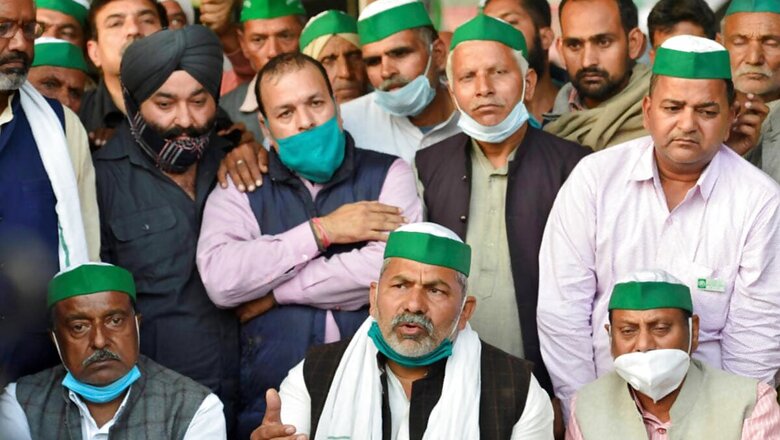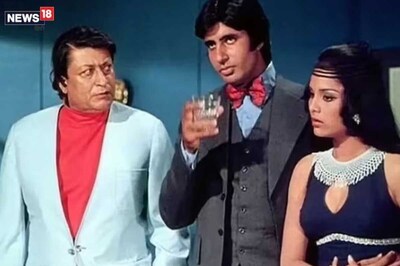
views
Till a day after Republic Day on January 26, the ongoing farmers’ agitation was not being seen as a significant threat to the Bharatiya Janata Party’s political capital. The reason being the movement along Delhi’s borders for over two months was primarily viewed as a protest by farmers of Punjab, the state where the BJP is a minor political force and had generally depended on its estranged ally Shiromani Akali Dal.
All through the months of December and January as the major thrust of the agitation remained on the Singhu and Tikri borders of Delhi and Haryana, the Kisan Dharna at the Ghazipur Border with Uttar Pradesh was often seen more as a sideshow. In terms of buildup and overall momentum, it was clear that the movement in UP didn’t have the Punjab and Haryana sort of passion and anger. For the BJP it was obviously a reason of relief: the party’s actual political capital lay invested in Uttar Pradesh and that too heavily in western UP.
Leading the agitation at the Ghazipur border were Naresh and Rakesh Tikait. The brothers from Muzaffarnagar who also head the Baliyan Khap that is ranked as one of the biggest among the Jat community. Natives of Sisauli village, the brothers have emerged from the legacy of their father Mahendra Singh Tikait, the man who kickstarted some major movements, often stroked controversies and was once titled “Mahatma” by a leading English daily.
Over the months and following rapid developments in the past week, the Ghazipur protest site has become a new flashpoint and Rakesh Tikait has emerged as one of the stalwarts of the agitation against the Centre’s new farm laws. As attempts to end the dharna by force were washed away in the tears of Rakesh Tikait, it is the BJP which is now feeling the heat.
As massive panchayats of khaps and farmers continue to extend support to the agitation, the protest has gained momentum in UP. The question is can it dent the BJP’s poll prospects ahead of assembly elections early next year?
THE TIKAIT LEGACY—STRUGGLES AND POLITICAL OPPORTUNISM
For long the leadership of the Baliyan Khap has been with the Tikait family, the sarpanchi often being hereditary. But it was not till the mid 1980s that someone from the family that hailed from Sisauli village of Muzaffarnagar shot to national fame and became a leader in his own might. It was Chaudhary Mahendra Singh Tikait who rose to become the new voice of farmers in western UP, often also referred to as “Jat land”.
It was the time when the aura of former Prime Minister, the “messiah of kisan”, Chaudhary Charan Singh was diminishing and his US-returned son Ajit Singh was not in a position to inherit his father’s legacy. The elder Tikait emerged as the tallest leader of a massive movement on the issue of electricity tariff hike against the Veer Bahadur Singh-led Congress government in the state.
It was also the period which saw the formation of the Bharatiya Kisan Union (BKU) under Mahendra Singh’s leadership. From then on for many years, Tikait senior led several major campaigns, including the historic 1988 Boat Club protest in the national capital. The movement also saw Rakesh leaving his job as a constable with Delhi Police and jumping into the agitation.
However, with time the claimed political neutrality often faced serious questions. Following the demolition of the Babri Masjid in 1992, Mahendra Singh Tikait stoked controversy when he issued an appeal to “vote in the name of Lord Ram”. The years that followed saw Tikait throwing his weight behind political parties depending upon public mood and prevailing equations. In 2007, Rakesh, his son and the present day star, even contested the assembly elections on a Congress ticket. The senior Tikait’s major confrontation with BSP supremo and the-then chief minister Mayawati in 2008 was another high point.
2013 MUZAFFARNAGAR RIOTS AND THEREAFTER
The year 2013 came as a defining moment both in the politics of western UP and that of the Tikaits. While Mahendra Tikait was fading from social life because of old age, the politics of Hindu-Muslim communal polarisation was fast gaining ground in the Jat land. It is no secret that the 2013 Kanwal Panchayat, which is alleged to have triggered one of the most gruesome riots that claimed 63 lives, was fully supported by the Baliyan Khap of which the Tikaits were a prominent part.
Since then, all through the general elections of 2014, UP assembly polls of 2017, and then again in the 2019 Lok Sabha polls, the dominant Jats in western UP have largely remained with the BJP. Rakesh Tikait was quick to learn lessons, when as a Rashtriya Lok Dal candidate from Amroha, he got less than 10,000 votes.
Going by the community’s mood, the Tikaits then supported the BJP in the 2017 and 2019 elections. Though no open endorsements were made, the neutrality clearly was lost, a fact which the Tikaits now publicly lament. Caught in the heat of the ongoing protests, elder brother Naresh and the younger Rakesh now say, “Voting for the BJP in 2019 was a mistake.”
AHEAD OF 2022 POLLS, HAS BJP HIT A SPEED BUMP?
The teary eyes of Rakesh Tikait, building up of his leadership and growing stature are now also being observed for their possible political and electoral impact. The massive turnouts in the panchayats held in Muzaffarnagar, Bijnor and Meerut have clearly raised concerns for the BJP and given new hope to opposition players like the RLD, Samajwadi Party and Congress.
As khap after khap rallies behind the Tikaits and extends support to the protests against the farm laws, there is an increasing sense of vulnerability within the BJP ahead of 2022 UP assembly polls. The fact that the Muzaffarnagar Panchayat saw the return of shared unity of Hindu and Muslim khaps can be a cause of further concern for the saffron dominance.
However, a lot will depend on how Rakesh and Naresh choose to move forward. Will they continue to remain as distanced from the BJP as they seem at the moment or can the BJP yet again broker a deal? Good personal rapport between the Tikaits and the top leadership of the BJP is not too far back in the past. The answer lies in the future and how the movement goes forward.
Read all the Latest News, Breaking News and Coronavirus News here



















Comments
0 comment